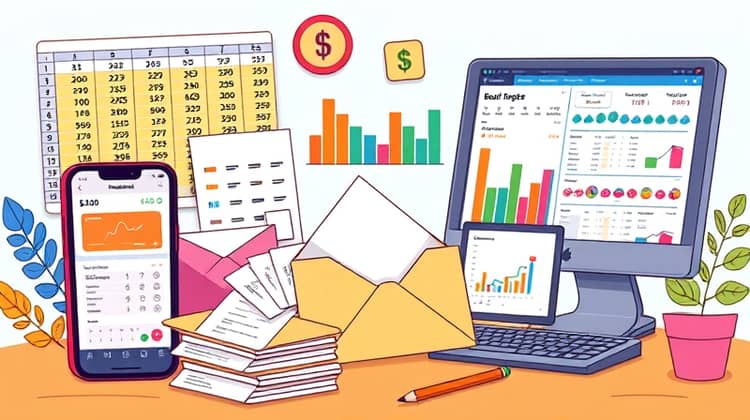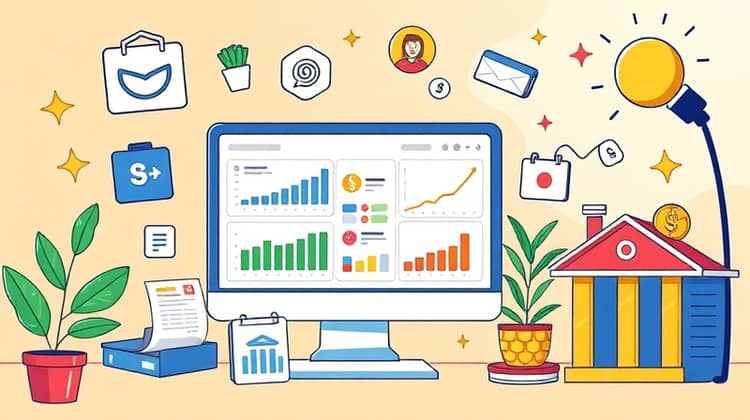Maximize Your Savings: How Budgeting Tools Can Help You Achieve Your Goal

In an increasingly complicated financial landscape, managing your money effectively is more important than ever. With rising living costs and unexpected expenses, having a solid budgeting strategy in place can mean the difference between financial stability and stress. Enter budgeting tools: innovative solutions designed to simplify the process, provide insight, and help you make informed financial decisions.
This article delves into the various budgeting tools available on the market, their features, and how they can help you maximize your savings. We will explore the importance of budgeting, the types of tools at your disposal, and practical tips to implement an effective budgeting strategy that meets your financial goals.
Whether you're just starting out or are looking to refine your current budgeting method, understanding the role of these tools can empower you to take control of your finances and secure a brighter economic future. Let's begin by understanding the importance of budgeting.
Understanding the Importance of Budgeting

Budgeting is more than just a financial chore; it is an essential skill that everyone should master. It provides a framework for how you manage your money, can help prevent overspending, and allows you to prioritize your financial goals, whether it’s saving for a house, retirement, or that dream vacation.
By creating a budget, you gain a clearer picture of your income and expenses, enabling you to make informed decisions about where to allocate your resources. In a world where impulsive spending is just a click away, effective budgeting becomes even more crucial for maintaining financial health.
Moreover, a well-developed budget can reduce stress by eliminating the uncertainty of financial fluctuations. When you know exactly where your money is going each month, it minimizes the chances of unexpected financial emergencies, allowing for better planning and peace of mind.
Different Types of Budgeting Tools

When it comes to budgeting, various tools cater to different needs and preferences, making it easier than ever to find a solution that works for you.
- Spreadsheets (Excel, Google Sheets)
- Mobile budgeting apps (Mint, YNAB, PocketGuard)
- Envelope system (cash-based budgeting)
- Online banking tools (balance tracking)
- Personal finance software (Quicken)
These tools can simplify tracking your expenses and income, automate tasks you would typically do manually, and help you visualize your finances clearly. Selecting the right tool for your unique situation is step one toward achieving your budgeting goals.
How Budgeting Tools Can Help You Save

Utilizing budgeting tools effectively can lead to significant savings over time. One of the key advantages of these tools is that they enable you to identify areas where you can cut back on unnecessary spending. By analyzing your monthly expenditures, you may discover subscriptions you're not using or habits that could be adjusted.
Additionally, budgeting tools typically allow for the setting of savings goals. Many apps provide features like 'goal tracking' that encourage users to aim for specific financial targets, such as building an emergency fund, saving for a down payment, or even a vacation fund. This creates a visual representation of your progress, which can be highly motivating.
Furthermore, many budgeting tools integrate with your bank account, allowing for real-time tracking of your spending and income. This immediacy helps you stay accountable, making it simpler to adhere to your budget and avoid overspending.
Features to Look for in Budgeting Tools

When choosing a budgeting tool, consider what features will best support your financial planning efforts.
- User-friendly interface
- Data synchronization with bank accounts
- Goal-setting capabilities
- Expense categorization
- Reports and analytics tools
These features can greatly enhance your budgeting experience, allowing for greater personalization and effectiveness in achieving your financial objectives.
Tips for Effective Budgeting

Creating and sticking to a budget can be challenging, but implementing some effective strategies can ease this process. First, ensure you allocate funds for both necessities and discretionary spending; this balance will prevent feelings of deprivation and increase your chances of sticking to your budget long term.
Second, review your budget regularly to ensure it aligns with your financial situation. Life circumstances change, and your budget should be flexible enough to adapt accordingly. Re-evaluating it every few months will help you stay on track and adjust to any changes in your income or expenses.
- Track all your expenses for a month to gauge your spending habits.
- Set clear financial goals to direct your budgeting efforts.
- Automate payments and savings to simplify your finances.
- Use budgeting tools consistently for better accountability.
- Reward yourself for sticking to your budget to keep the momentum going.
By following these tips and leveraging the power of budgeting tools, you can create a personalized plan that ensures financial health and allows for achieving future savings goals.
Challenges and How to Overcome Them

Despite the numerous benefits of budgeting, it's not uncommon to encounter obstacles along the way.
- Unexpected expenses that disrupt your plan
- Difficulty sticking to a budget during entertainment-heavy months
- Short-term temptation to overspend
- Confusion around tracking multiple accounts
Recognizing these challenges is your first step to overcoming them. Establishing an emergency fund, utilizing digital alerts for budget limits, and continuously educating yourself about personal finance can significantly ease the budgeting process.
Conclusion

In summary, budgeting is an integral component of sound financial management, and budgeting tools can help you navigate this important aspect effectively. From identifying spending patterns to promoting savings through goal setting, these tools offer tremendous value for anyone looking to enhance their financial status.
By understanding the different types of budgeting tools and the features they offer, you can select the right one to suit your needs. Furthermore, implementing practical tips can help solidify your budgeting efforts, turning them into habits that lead to greater financial freedom. Finally, being aware of the potential challenges allows you to prepare and adapt your strategies to ensure continued success.
Ultimately, the journey toward maximizing your savings begins with an effective budgeting tool, enabling you to take control of your financial future. Embrace budgeting today, and watch your savings goals transform into reality.






